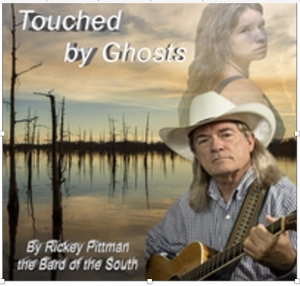In my English Composition 1002 course I teach at the University of Louisiana at Monroe, I have students do a visual analysis of an album cover, a work of art or an advertisement. I wanted to share this review by Tyler Thomas, who chose my original song and cover, “Touched by Ghosts.”
Visual Analysis of Touched by Ghosts
Touched by Ghosts is a single by the artist Rickey Pittman. He is a country and western singer who sings with a folk tone. He is also a professor at the University of Louisiana at Monroe. The album cover depicts an eerie scenario. The eerie cover goes along well with the eerie tone of the song.
The cover says a lot about Pittman’s style. It has a picture of him at the bottom left corner. He is holding an acoustic six-string guitar and wearing a cowboy hat, showing that his music has a deep-rooted country and western vibe. He is sitting very cool, calm, and collected. You can tell from the look in his eyes that he is very serious. It is almost as if he truly believes all of the words in his song are a true story of his life.
There are a few reasons why I chose this album cover over all of his others. The main reason is because it contains my favorite song of the artist. The second reason is because of how well the album cover compliments the songs on it. Both the song and album cover give the audience the exact same feel. The last reason as to why I chose this cover is because it is so well designed. I like how beautiful the scenery is.
The album goes along with the song perfectly. Throughout the song, he tells a story. He talks about the legends of Louisiana repeatedly. The background of the album is a photograph of a swamp that can be assumed is somewhere in the state he resides in. Also, behind the image of him in the corner, there is another image. There is an image of a girl. She seems to be faded, maybe hinting to the viewer that the girl is a ghost.
If you look closer, the cover tells a deeper story. You can tell that the girl is meant to portray a ghost. The placement of the ghost girl is a big deal also. The ghost girl is placed behind him. That is because the song is telling about all of the things he has done, as in all of that is now behind him. There is, though, a chance that the woman behind him is one of the “many of cajun queen” that line three speaks of.

